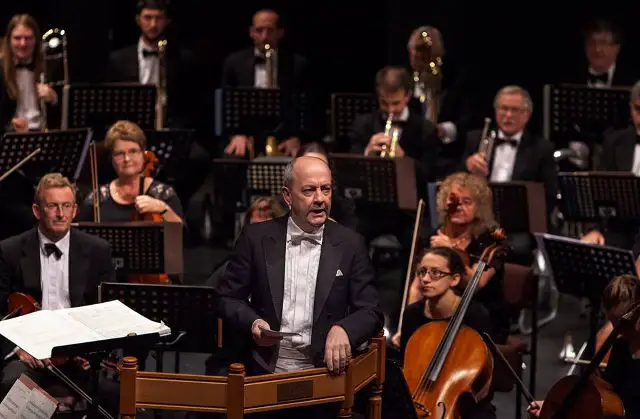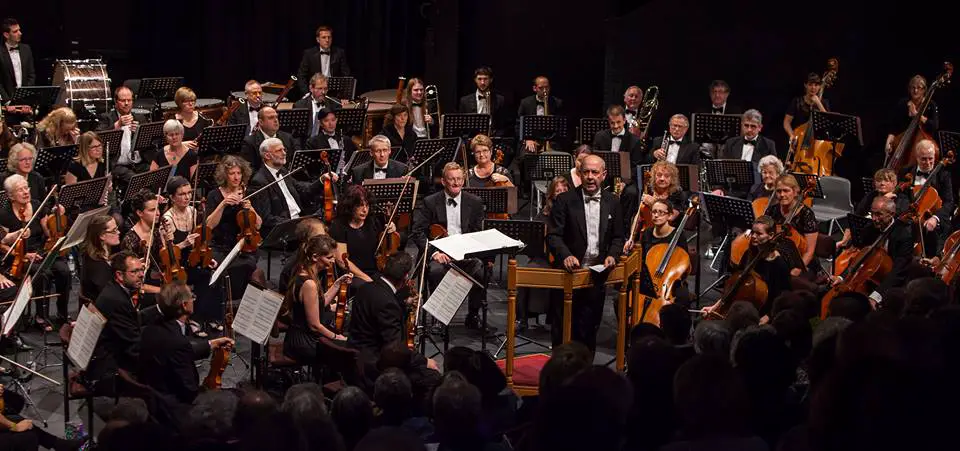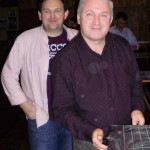Our thanks to Jonathan Dodd for his latest review of the Isle of Wight Symphony Orchestra (IWSO). Ed
Last Saturday the Isle of Wight Symphony Orchestra’s new season burst upon us with a concert of bravado and energy and sublime playing. It was great to see them returning in such good shape. It was pleasing also to see that the house was packed full.
Before the first piece, the Overture: Portsmouth Point, by William Walton, our conductor Jonathan Butcher gave a short introduction about the difference between rhythm and metre for the benefit of concertgoers like me with uncertain musical knowledge. As far as I understand it, rhythm is the pattern of the tune or melody as it is sung or played, with longer and shorter notes, and metre is the regular beats that keep time in the background.
Rhythm and Metre
So far so, good, unless Mr Butcher’s explanation was lost on me. The metre can be based on three or four or any number of beats in a bar. Walton’s Overture was designed to describe a rollicking and busy scene on Portsmouth harbourside in the early nineteenth century, wherein various sailors were carousing and drinking and dancing and engaging in various unsalubrious activities.
Walton incorporated a huge number of changes in metre during the piece, thereby making it horribly difficult to play because of the difficulty of keeping time, but also to illustrate the different varieties of activity. We were told that Walton wrote the piece so that all these changes should happen seamlessly. And they did.
A wonderful opening to the new season
I’m glad to say that I sat entranced through the whole thing as it rollicked along but I soon lost count of these changes because I was so absorbed by the liveliness and variety of effects and tunes and rhythms of this picturesque and energetic piece. It was a wonderful opening to the new season and an enjoyable showpiece for all sections of the orchestra.
The second piece to be performed was Max Bruch’s well-loved 1st Violin Concerto. Even I am familiar with it, and it regularly appears in Classic FM popularity lists. It doesn’t attempt to be clever or ground-breaking, but the music is achingly romantic and engaging.
Total engagement with the music
The soloist, Alexander Sitkovetsky, has performed with the IWSO several times before, and was warmly received when he appeared. Before he played, he addressed the audience, dedicating the concert to the memory of those victims of the Paris outrage who were at a concert enjoying music together when the terrible events unfolded last weekend. It was a very moving speech and added a thoughtful seriousness to the flavor of the performance.
Right from the start, Mr Sitkovetsky was inspired. His playing soared above the orchestra with a skill and clarity that was truly beautiful, and his total engagement with the music and the performance shone out. It was wonderful to see how the orchestra loves to play with him and how closely they work together. He received a well-deserved standing ovation. I look forward to his next visit.
Many different elements and moods
After the break the orchestra played us Mahler’s First Symphony. It was interesting to read the excellent Programme notes by Jane Pelham. I confess that I haven’t become a Mahler fan yet, and I suspect that his works need to be listened to more than once to begin to appreciate fully.
Mahler himself took several years to complete the version that became his First Symphony. It started out as a Symphonic Poem, and went through several formats. It is commonly called the ‘Titan’ Symphony, because it was originally about a great king of that name. There are many different elements and moods in this symphony, ranging from very quiet and peaceful pastoral scenes to very loud sections, and it incorporates popular songs and dance music.
I would like to have them start all over again
The orchestra attacked this immense work with flair and enthusiasm, and their performance was remarkably clear and disciplined and at a sustained level of concentration. They must have been exhausted by the end. It was large and magisterial and beautifully performed.
There were so many lovely moments that I would like to have them start all over again. I can only apologize for not knowing the symphony better, and I’ve resolved to listen to it several times before it’s next performed.
Book now for next concert
Next time the IWSO will be playing Elgar’s Cello Concerto, another piece I know, with Richard Harwood as the soloist. I’m really looking forward to that. They’ll also be playing Dvorak’s sixth symphony, which will be new to me, and Mendelssohn’s Nocturne from A Midsummer Night’s Dream. That’ll be a treat. And there’ll be the Farnham Festival Overture, by Richard Rodney Bennett. Marvelous!
That’ll take place on Saturday 23rd January 2016. I can’t wait. Get your tickets in plenty of time. I think it’ll be packed again. See you there.
Image: © With kind permission of Allan Marsh






